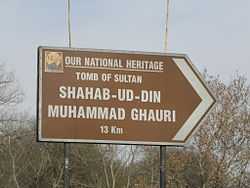Sohawa
Sohawa (Punjabi,Urdu: سوہاوہ) is an administrative sub-division (tehsil) of Jhelum District, situated in the Punjab province of Pakistan.[1] Sohawa has grown from a small village in 1947 to a large town in 2009, development in transportation, education and health has played a major role in the development of the town. In general there are small towns at roughly at 10 mile intervals along the great trunk road between Peshawar to the border of India near Lahore.

History
The etymology of the name Sohawa has not been proven, but according to folk etymology the original name was Soo Awa which means "100 fences of potters". Sohawa was originally a small village near to Khoraka, after several years of human settlement in these two villages, the original village of Soahwa and Khoraka merged with each other and the present town of Sohawa was formed that contained market of all types. The original village is part of the main town(khoraka) and called "Ward #1" or Purana Sohawa (literally "old Sohawa").Sohawa is well known for its natural beauty and the energetic youth.
Geography
Sohawa is situated in north-western part of the district Jhelum, Punjab lies on GT road between Gujar Khan and Dina. Its geographical coordinates are 32° 49' 30" North, 73° 45' 55". One sign of Sohawa is the toll plaza by the name of 'Tarakki' on the Grand Trunk Road. Bazaars of Sohawa attracts people from nearby villages, these bazaars are located both sides of G.T.Road. Major towns or villages of Sohawa Tehsil are Kot Dhamiak, Chak Tareda, Domeli, Lehri, Dewan-e-Hazoori, Bakrala, Dhouk Aamb, Sasral etc.
Sociology
The population mostly consists of 3 (Rajput, Jatt and Mughal) tribes. The major profession of people is service in Armed Forces, hence they are generally disciplined and law abiding. A large number of people of Sohawa are settled in foreign countries particularly Western Europe and Middle East. Main source of livelihood of the people is agriculture.
Health
A Tehsil Headquarter Hospital (THQs) Sohawa for the people of Sohawa and surrounding rural areas has been developed by the Government of Pakistan that provides only basic health facilities. For critical health problems peoples have to move to more advanced hospitals. this hospital is currently 40 bedded 20 for female and 20 for male patients followings facilities are available emergency services 4 bedded, labour room services, Operation theater facilities, dental surgery, ambulance services, indoor services lab, X-Rays, Ultra sonography facilities, ECG facilities, Blood Bank (Under Construction) 24 hours round the clock & OPD curative, preventive, promotive & rehabilitative services. Following Post of Specialists are still vacant Medical Splt, child splt, Gynaecologist, Eye, ENT Splt, pathologist, Radilogist. this hospital offers free facilities for MCH, Deliveiris. presently there are three lady doctors to provide 24-hour labour room cover. Further one Rural health center Domeli, 12 basic health units (Adrana, jandala, nagial, gurah uttam singh, kohali, Phulray syedan, surgdhan, dewan e hazoori, pail mirza, karounta, panchor & Banth)3 Government rural dispensaries (Lehri, Gaddar, Baragawah) 4 Rural dispensaries (dial, Hayal, Pari derwaiza & Dhairy bakrala)are also providing health services.
Tribes and clans
The major tribes and clans of the district are the following:
- Chaudry (Jats)- (Makwal, Khattar, Soomro, Hariar, Jandrial, Kamawal, Kalyals, Kanyals, Khatarmal, Mathyals, Tarar, Dhillon
- Rajputs - (DHAMIAL RAJPUTS,BANGIAL, Akra, Bhatti, Chauhan, Janjua Rajput, Budhal Rajput and Manhas), Panwars
- Awan Malik
- Gakhars Kayani
- Sayyid (Bukhari, Kazmi)
- Kashmiri
- Mughals
- Sheikhs
- Kassab
- Gillzai Jats (Mostly Belongs to Minorities)
References
Footnotes
Notations
- http://www.nrb.gov.pk/lg_election/union.asp?district=12&dn=Jhelum
- http://harrysworldatlas.blogspot.com/2008/03/pakistan-pk-punjab-province-rawalpindi.html
